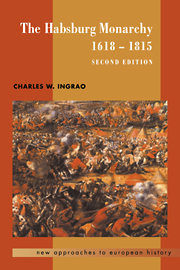Book contents
- Frontmatter
- Contents
- List of maps
- Genealogical tables
- Preface
- 1 The distinctiveness of Austrian history
- 2 The Thirty Years' War (1618–1648)
- 3 Facing east: Hungary and the Turks (1648–1699)
- 4 Facing west: the second Habsburg empire (1700–1740)
- 5 The Prussian challenge: war and government reform (1740–1763)
- 6 Discovering the people: the triumph of cameralism and enlightened absolutism (1765–1792)
- 7 The age of revolution (1789–1815)
- 8 Decline or disaggregation?
- Bibliography
- Index
- More titles in the NEW APPROACHES TO EUROPEAN HISTORY series
5 - The Prussian challenge: war and government reform (1740–1763)
- Frontmatter
- Contents
- List of maps
- Genealogical tables
- Preface
- 1 The distinctiveness of Austrian history
- 2 The Thirty Years' War (1618–1648)
- 3 Facing east: Hungary and the Turks (1648–1699)
- 4 Facing west: the second Habsburg empire (1700–1740)
- 5 The Prussian challenge: war and government reform (1740–1763)
- 6 Discovering the people: the triumph of cameralism and enlightened absolutism (1765–1792)
- 7 The age of revolution (1789–1815)
- 8 Decline or disaggregation?
- Bibliography
- Index
- More titles in the NEW APPROACHES TO EUROPEAN HISTORY series
Summary
It is one of the paradoxes of Charles VI's reign that he expended so much effort securing recognition of Maria Theresa's rights to the throne, yet did virtually nothing to prepare her for the awesome challenges that she would face. Her Jesuit education had been wholly bereft of instruction in the elements of statecraft. Her father had even excluded her (though not her husband, Francis Stephen) from the councils of state. Whereas she had no government experience, the ministers she inherited from her father had too much: at ages 67, 69, 70, 71, and 77, the five permanent members of the Privy Conference averaged more than three times Maria Theresa's 23 years. State finances were no less decrepit. Charles VI's last wars had obliged the Hofkammer to pawn nearly half of its annual cameral revenue of 10 million fl., with the result that part of the Contribution had to be diverted from the military to debt service. So severe was the fiscal crisis that barely half of the monarchy's supposedly 160,000-man army was actually under arms. With only 87,000 fl. of cash on hand and a 103 million fl. state debt, the archduchess was in no position to fight a major war.
The consequences were predictable enough. With the emperor's death Elector Charles Albert lost no time in presenting Bavaria's fraudulent claim to the Erblande. He was, however, in no position to act without the outside assistance of more powerful countries that had already recognized the Pragmatic Sanction.
- Type
- Chapter
- Information
- The Habsburg Monarchy, 1618–1815 , pp. 150 - 177Publisher: Cambridge University PressPrint publication year: 2000

